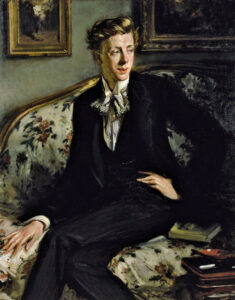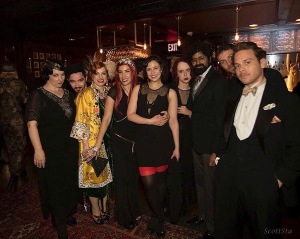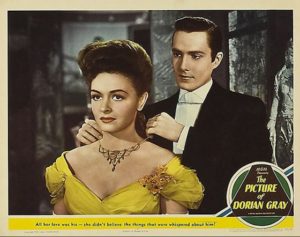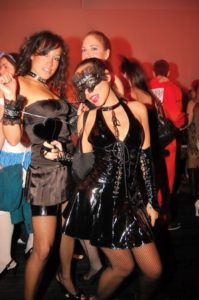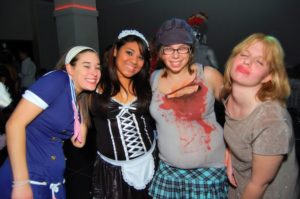Dorian Gray is having more fun than you
by Tara Isabella BurtonYou don’t know how you know Dorian Gray.
When Dorian Gray first added you on Facebook, you two had sixteen mutual friends. You had been in New York six weeks, and you were always drunk. You figured you’d met Dorian Gray at one of your parties – your riotous parties, your all-night parties, your starlit limoncello-in-a-water-bottle rooftop parties you’d come to this city for, the ones you spend more time than you’d admit wrangling invitations to. You thought you’d met Dorian Gray, kissed on both cheeks, talked about the nature of beauty, and forgotten it.
Deep down, you know you’re wrong. You could never forget Dorian Gray.
You don’t know if Dorian Gray’s a man or a woman. Dorian Gray is swan-neck-slim and has close-cropped bright pink hair. Dorian Gray has dark, thick lips and eyelashes like moth wings.
Sometimes.
You’ve seen photographs of Dorian Gray in plus-fours and Oxfords and cricket whites.
You’ve seen photographs of Dorian Gray in back-seamed stockings and a black leather corset: embossed.
You’ve seen a lot of photographs of Dorian Gray. In every one, Dorian Gray is a revelation from the mind of God.
Dorian Gray is probably not really called Dorian Gray. You know this.
But Dorian Gray is the name Dorian Gray gives himself, and you have nothing else to go by. So when you bring him up, every now and then, among your friends who are also his friends on Facebook, but who don’t know him any better than you do, you make sure to laugh a little so that your friends know you know better than to believe that Dorian Gray means a single word Dorian Gray says.
You arch your words like a roller coaster: “What do you think Dorian Gray is up to tonight?” You say it like it’s only just occurred to you, like you don’t really care. “What color do you think Dorian Gray’s hair is today?” You say it like you’re in on the joke. You say it like you and Dorian Gray are in on the joke together.
You’d want to be a poem, only you’d never found words that say the things you want them to. You’d want to be a painting, but nothing you ever see looks how you imagined it.”
Your friends laugh with you. You concoct hoary stories: Dorian Gray is drinking Elderflower Collinses in a speakeasy accessible only through a hidden bookcase in the Morgan Library. Dorian Gray is escorting a sequin-dripping dowager to the Metropolitan Opera, to a private box. Dorian Gray is dressed like Norma Desmond on a Ridgewood rooftop peopled exclusively by fire-eaters.
You’re only half-joking.
You’re not really joking.
You never really know when you’re joking.
This is what you want, but will never admit you want:
You want to be art.
You’d want to be a poem, only you’d never found words that say the things you want them to. You’d want to be a painting, but nothing you ever see looks how you imagined it. You want to be a series of stories other people tell about their brilliant friend with spiked, flamingo hair. You want to burn brightly with a hard, gemlike flame.
That is what you came to New York for.
You’re too self-aware to ever admit this.
You know exactly how your friends would look at you if you admitted this.
When you first came to New York, you came up swinging: saying things like that, and a whole lot else besides, because everything you knew about that life of yours to come you’d read in books where people admitted such things out loud. You’ve learned to disavow them now. You’ve been in New York six months.
You’re not a high school senior from Teaneck, who gets a fake ID to go to the midnight screening of The Rocky Horror Picture Show with the cool kids from NYU.
You go to much better parties now.
You need a password to go to the kind of parties you go to.
Only sometimes, after those parties, you sit in front of your mirror, in the apartment you share with Iolanthe the burlesque performer in Washington Heights. You put lipstick on half your lips. You put mascara on one eye. You smear glitter over one eyelid. You look at what you have made yourself become: androgynous, pure, so much more than just one self.
Then you think: I can be this, always.
You think: I am so much more than a body.
In those moments, you transcend sex. You transcend meat. You transcend how much money is left on your Metrocard, and the emails ConEd keeps sending you about the gas bill, and Iolanthe’s inability to turn off the kitchen lights when she goes out.
You can transcend all this: for moments.
Dorian Gray transcends them all the time.
He is wearing a cape of peacock feathers. He is sexless like an angel. Nobody in his pictures ever seems to think he looks ridiculous. He does. He doesn’t. You never know.”
At first you like looking at Dorian Gray’s photographs. They make you feel safe. They make you feel that somewhere, in some elbow of this sprawling and oxymoronic city, there will be a place for you. When you find it, you will be just like him.
At midnight, when you can’t sleep, you look at these things:
Dorian Gray as Marie Antoinette, in a red taffeta dress that reaches to the floor, and a powdered wig, and a mole on his upper lip. In a Victorian mansion in FiDi, somewhere you can’t afford to go.
Dorian Gray in a leather choker, in a fishnet vest, with muscles you did not know the body was capable of producing. On the High Line, long after the High Line is closed.
Dorian Gray with Salman Rushdie.
He is wearing a cape of peacock feathers. He is sexless like an angel. Nobody in his pictures ever seems to think he looks ridiculous.
He does. He doesn’t. You never know.
All you know is that you too can be Dorian Gray.
Once you know this city a little better. Once you earn it. Once you finally grow up.
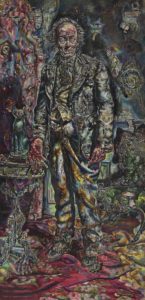
The Picture of Dorian Gray by Ivan Albright, 1943–44. Art Institute of Chicago / Wikimedia Commons
In a powdered wig, in a leather choker, in sequins and peacock feathers among people who have red every single book that’s ever been written, you will become just like him.
Not now, maybe. But soon.
You click through his photos late at night. You right-click-save the one you like best.
Not that you Like it. You’d never Like it.
You don’t want him to know how much you like it.
This is what you do, your first six months in New York.
You let Iolanthe take you to half-hearted parties: vintage events where nobody really dresses up and the few that do get their feather boas from Ricky’s and their five-dollar corsets from Hong Kong ($4.99 free shipping. You used to wear them, too.)
Everything you and Iolanthe do disappoints you.
At the electro-swing party at the Gowanus loft, they charge for water even though it’s summer and there are no windows and there’s no A/C and no fan and everyone is in steampunk for some reason.
At the Bushwick loft poetry reading, each poet reads for thirty minutes, and then a Czech documentarian who nobody knows gets up and tells everybody he wants to screen an hour-long documentary he’s made. You pretend to go to the bathroom and never come back.
The immersive, interactive, open-bar performance of A Midsummer Night’s Dream in Crown Heights isn’t actually immersive. The actors sit on your lap when they’re being fairies. That’s all. The ‘open bar’ is a pitcher of sangria that they don’t even break out until after the show is already over.
You go dancing, but you don’t know how.
But you don’t mind.
One day, you tell yourself. One day. On that day all will be revealed.
So you go outside for cigarettes, only you don’t smoke them. Instead you spend ten minutes on your phone, looking up Dorian Gray’s profile pictures. You turn on your back-facing camera and then you take so many pictures of yourself against so many like-bricked buildings. You take so many pictures of yourself with his expression on your lips.
They all make you look fat.
When you have been in New York six months, Iolanthe invites you to the party that will change your life. It’s a Vanished Centuries party operated out of a secret bookstore in Yorkville, operated by someone more interesting than you are out of a rent-controlled one-bedroom apartment, where the hallway is books and the bedroom is books and the kitchen is books and there aren’t any toilets or sinks, because everyone who goes there lives on books alone.
This is what you have come to New York for.
They suggest costumes. You like this. It means you can flay yourself: turn your skin into a canvas and paint and glitter all over it and then drape it back on, inside out. It means you can mold your sex, like your eyebrows, into the shape this evening makes you feel.
Like it wouldn’t kill you to do that. Like you’re not a body that can be killed. Like you’re only an artist, and your body is a thing that you have made sing, and shine, and fly.
You and Iolanthe spend all weekend on your costumes. She sews a desiccated piece of taxidermy onto a dress from the Greenpoint branch of Beacon’s Closet whose zipper does not work. You crazy-glue some gold brocade onto a blazer you already own to make it into a military jacket.
You try on your costume at lunchtime and you can’t bear to take it off. You even skip lunch, because you don’t want to go outside wearing it, because you’re self-aware enough to remember that you live in Washington Heights, and you don’t want your neighbors to hate you.
So you pace. You pace like you’re an Austro-Hungarian military officer and you’re waiting for the arrival of the countess who is your lover.
You take a picture in the mirror.
Dorian Gray could not look more perfect than you do right now.
You’ve dyed your hair pink.
Don’t pretend you are too old for this. Don’t pretend you are too wise. Don’t pretend you know better, just because you say – out loud – that you do.
What you say out loud doesn’t matter. Oscar Wilde was a great liar, and so are you.
This is what you do at the party:
Stand in line on a street corner. Check your phone. Check in.
Wait until someone more confident than you are presses the buzzer.
Follow her. Don’t make eye contact.
Enter an apartment smaller even than yours, so thick with pot smoke you start to cough the second you get in. Wipe your mouth and smear lipstick all over your white, swan-like hands.
Stand in a corner with Iolanthe. Realize nobody wants to talk to you.
Stare at a collection of 1950s pulp erotica. Look busy. Look like the sort of person who is too busy to talk to other people.
Put down the erotica. Try not to look like a pervert.
Take a photograph of Iolanthe.
Drink.
Drink some more, even though wine is fifteen dollars a glass, plus tip. Even though they’re box wines. Even though that’s your cab fare home.
Pose for Iolanthe’s camera.
Realize you look like an old Italian whore.
Delete it.
Repeat this process five or six or twenty times until there’s a version of yourself you can live with.
Start talking about the meaning of art to a stranger who keeps his eyes five inches above your left shoulder, looking for someone better.
Realize that you are no better than anybody else.
Realize that you are just like everybody else.
Stagger to your feet before Iolanthe can stop you (Iolanthe’s not looking at you; she’s looking at her phone, and giving the impression that she has another, better, engagement, although if you really thought about it you’d realize that she’s just afraid of being as alone as you are).
Run to the bathroom. Lock the doors.
Realize this:
This is my body. This is my sex.
Smear your mascara, crying.
I am already grown up. Everything that I am waiting for has already happened. My life has already started. This is what it is. These are exactly the parties I dreamed of. These are exactly the people I have dreamed of. This is exactly how they are. This is how the world is.
This is how the world is.
Check your phone.
Dorian Gray has posted two new photographs.
Dorian Gray, in a perfect Austro-Hungarian military uniform, in front of a stack of 1950s pulp erotica. His hair is even pink.
Dorian Gray is smiling how you wish you could smile. Dorian Gray is smiling like he owns the world and everyone in it. Dorian Gray is smiling like he knows how much better he is at this at you are.
Dorian Gray is having the time of his life.
Here is what you’d probably tell yourself, if you were sober.
Dorian Gray is a liar. Dorian Gray is a fraud. Dorian Gray is just pretending, like we’re all just pretending. Dorian Gray is just as miserable and lonely as everybody else.
If Iolanthe were listening, that’s probably what you’d say.
But you wouldn’t believe it, not really.
What you’d believe is what you believe now.
Dorian Gray is having more fun than me.
You ask her if she’d even recognize him. ‘Don’t be stupid. We’re Facebook friends.’ Nobody could see Dorian Gray and not know him.”
So you stumble out of the bathroom, flinging the door so wide that everybody turns to look at you, stunned that you’re making your unbelonging so obvious, and you elbow past a six-foot-tall girl in a white fur cape, back to Iolanthe, back to the one room you can breathe in, back to Dorian Gray who is wearing a perfect Austro-Hungarian military uniform, who is having the time of his life, whom you will finally see.
Not through a glass darkly, but face to face.
Dorian Gray is nowhere to be found.
“Maybe it was another night?” Iolanthe says, when you shake her. “I’m telling you, I didn’t see him.”
You ask her if she’d even recognize him.
“Don’t be stupid. We’re Facebook friends.”
Nobody could see Dorian Gray and not know him.
You show her the photo and she looks at you like you’re so much drunker than you know you are.
“Maybe left.”
You slur a ronde around the room, asking everyone if they’ve seen him. You show them the picture and at first they look at you funny, because your hair is pink and you’re wearing an Austro-Hungarian military uniform, and you’re asking them if they’ve seen this revelation, this revelation with pink hair wearing an Austro-Hungarian military uniform, and it’s only once you insist they look closer that they realize how much better-looking Dorian Gray is than you could ever be.
“I’ve never seen him before in my life,” says the tall girl with the cap, who hates that you’ve made her talk to you.
When you leave, ten minutes later, you check your phone again.
Dorian Gray has posted a picture with her. She’s kissing him on the cheek.
Dorian Gray is smiling at the camera and giving you two thumbs up.
That night you do not sleep. The laptop light on your face makes it ugly and jaundiced, and if you were your best self you’d care but right now you don’t care about anything except the fact that Dorian Gray was in that room, the room so small you couldn’t move in it or breathe in it, and you never saw him. You and Dorian Gray were at the same party and you never once lifted your face to his.
You look at the photos he posts. One by one you right-click-save. You marvel at how he angles his chin. You marvel at all the people who kiss his cheeks, the ones who looked over your left shoulder for someone better.
Well, here he is.
You’re an ugly drunk. You’re a weepy, ugly, messy drunk. You’re the kind of desperate, queasy, impotent drunk who uses drink as an excuse to rage against the things you deserve to be destroyed over.
You wish you’d seen him, so you could throttle him until his face mottled the color of his hair.
You pretend you’re sober. You put your hand on your chin. You smear away mascara tears.
You click Send Message.
You type and untype and retype. You spell every permutation of letters that ever has or could be recorded. You are the Book of Revelation. You are one million monkeys with typewriters.
This is the first thing you ever say to Dorian Gray:
Fuck you.
It’s not what Dorian Gray would have said. But we all know, by now, that you are no Dorian Gray.
You fall asleep without washing off your makeup. You get pimples.
You check your phone when you wake up. Dorian Gray has read your message. He has not responded.
Then you see your notifications.
That photo of you with the pink hair – that’s not so pink as his? With that Kindergarten brocade you sewed on that shitty blazer that didn’t fit? That lighting that kneads your face like dough? That angle that squashes your arms?
Dorian Gray Liked it.
Over the next few months, you and Dorian Gray go to all the same parties.
He beats you at all of them.
Not that you don’t do everything right. When you go to a reading, you study the authors in advance; you memorize their influences. You make sure you’re au courant with which editors work at which journals, and which publishing houses, and which ones have slept with Marlon James.
When you go to a costume party, you research the accuracy of your tailcoat, your bias cut, your shoes. You sew the trimmings yourself. You learn to dance the Charleston, the Lindy Hop, East Coast swing. You learn the best tonics to go with the best gins. You make friends with bartenders and drink for free.
You make yourself in the image of Dorian Gray. You make yourself his likeness. You make yourself the way you once thought everybody made themselves: molded from air and need.
But now you know. Only Dorian Gray can make himself that way.
You never see him.
Every party you go to, you scan the room, with terror and desire, hoping he’ll be there, hoping he won’t.
Every party you go to, you take photographs in the poses he’s taught you. You barge your way into conversations and insist, in a manner allusive but unmistakable, on your own importance. You make people talk to you. You make them listen. You make them pose for photographs with you, and you tag them, and sometimes they even Like it.
Usually, now, they Like it.
But every party, Dorian Gray is there.
He posts photos of himself with the friends you’ve just made, and their intimacy makes you feel lonelier than ever. He posts pictures of himself with an outfit just like yours, but better. He’s even found a way to improve upon the changing colors of your hair.
You go to parties of ten people, parties of a hundred. You go to parties where it’s impossible not to meet every single person in the room. You go to parties where Dorian Gray is present. You never see him. Not once.
You want to ask about it. You know you never can.
What would you say?
“Have you seen Dorian Gray?”
People would laugh at you. They’ve outgrown Oscar Wilde, and so have you.
Dorian Grays like Dorian Gray are artists. They don’t ever really mean what they say. He just wants you to know he’s watching you.”
You don’t write Dorian Gray.
Dorian Gray never answered your puerile, drunken message. Dorian Gray never wrote you.
But sometimes, every now and then, when your outfit is particularly fine, when you’ve posed in a particularly swannish way, Dorian Gray Likes one of your photos.
You know that doesn’t actually mean he likes it. Dorian Grays like Dorian Gray are artists. They don’t ever really mean what they say.
He just wants you to know he’s watching you.
You start to dream about fucking Dorian Gray.
You can’t, of course. Because you never see him. All you see are Dorian Gray’s resplendent photographs, his quotes, the glorious cross-stations where he goes. All you see is the greatest art you will never make.
But you fantasize about it.
Every night, you fantasize.
Sometimes it’s you fucking him; sometimes him fucking you, depending on how you imagine the masks of your bodies, depending on the day of the week.
You fantasize at the apotheosis about pulling off his head, climbing inside his body, wearing it like gold brocade.
It gets to the point where you can’t get off any other way.
You decide to kill Dorian Gray.
You’ve been in New York a year, and Iolanthe has wrangled invitations to a New Year’s party at a warehouse under the High Line. The curtains are red velvet and the vestibules smell of decaying flowers, but on purpose. The theme is Surrealism. You can’t afford to go, not really, but you’ve been in New York a whole year now, and you have so much to prove. There are people who’ve hurt you back home you; you want them to see the photos. You want them to see, so you can say look at me now.
Look at what I have made myself into now.
So you paint your face a watery green and go as Dali’s Narcissus.
Iolanthe fixes a pipe to a headband with beige yarn, and adds a papery veil on which she’s written ceci n’est pas une pipe.
You take so many photographs your phone runs out of space.
“It’s funny,” she says, through curtains of lipstick, “I never thought of myself as the pretty girl.” This is ridiculous, because Iolanthe is a burlesque performer, and an artist’s model, and maybe the most beautiful person you know that isn’t Dorian Gray.
But you think she thinks she means it.
“We look hot in these,” she says. She shrugs. “Post them.”
You do.
This will be the best night of your life.
You’ve figured this out already. You’ve decided it.
You will have more fun than you have ever had in your life. You will have more fun even than Dorian Gray. You will be sexless like the angels. You will have glitter in your hair. You will shine like Saint Sebastian, pierced through with arrows, except nothing pierces you now. You will pierce everyone else, straight through the heart, just by existing.
When you get there, you think maybe you’ve done something magical. You think maybe you’ve traded away your soul.
At last, this is how things are supposed to be at last.
This warehouse is a maze of mirrors, and in it is the world you always knew existed. The top floor is a forest; the basement’s a ballroom. There are rooms that are boudoirs and rooms that are city streets and rooms that are dark cabarets for red-silk women dressed as demons, and there are poets, and they will take you – for a fee – into one of the little back-rooms cluttered with chaises and whisper something they’ve invented in your ear. There is an open bar.
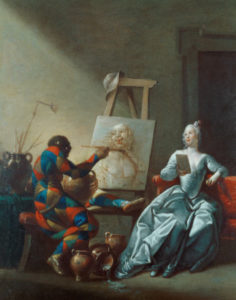
The Harlequin Painter by Giovanni Domenico Ferretti, c. 1742. Collezione Palazzo degli Alberti, Prato / Wikimedia Commons
You are Narcissus. The world is your mirror.
Not even Dorian Gray can spoil this.
You tell yourself: Dorian Gray cannot spoil this.
You drink champagnes from the palms of shirtless boys with glitter over their eyes.
You drink and then you whisper I am Dorian Gray.
There is nothing I would not give up to be Dorian Gray.
When the clock strikes ten you kiss a stranger in harlequin garb whose name, whose sex, whose age you do not know. All you know is that you’ve kissed someone whose wonder at you grew grave in darkened eyes, and you want to stay there forever.
But when you close your eyes, this is what you see:
Dorian Gray.
Dorian Gray, grinning with a hard, gemlike flame.
Dorian Gray, opening up the harlequin’s head. Wearing his skin like a cape. Slithering inside.
Dorian Gray, stretching him out inside yet another body that belongs, like all bodies, to him.
Dorian Gray, posting about it on Facebook.
You can never stop seeing this.
So you push the harlequin away. So you reel into a red room crowned with taxidermied crows, where a bespectacled boy with an apple in front of his face is fingerbanging his girlfriend and two ingenious urinals are passing a vaporizer back and forth.
So you delete Dorian Gray from Facebook.
Nice try.
You get two hours.
For two hours, you kiss more strangers, so lightly they do not worry you will want to go home with them. You drink champagne out of miniature bottles. You dance on tables and feel wonder wash over you with the halogen of the lights. You dance, dance, dance, and Iolanthe dances too, and drunk you even kiss her.
There is nothing to compare yourself to, now, now that there’s nobody else in the whole world, now you are the only human being in the world, now that you are the only human that exists and all other synapses are just flotsam, remnants of a prehistoric race you and you alone have transcended. You’ve been dancing so long you don’t feel the blisters on your feet, because that’s just how much more than a body you are.
You don’t wonder if Dorian Gray is at this party.
You don’t wonder if he’s there, invisible, and if he’s kissing the people you’d most like to kiss, or if his costume is finer than yours is, or if he with a nod and a smile is proving, all along, that your words and your art are as nothing, because they cannot convey what he can convey in a single glance.
Until, of course, you do.
Try to dance, but think so much you can’t carry the beat. Go to a mirror. Look at yourself. All you see is Dorian Gray. Like a mask of skin, right on your cheekbones.”
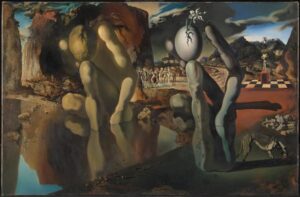
Metamorphosis of Narcissus by Salvador Dalí, 1937. Tate collection © Salvador Dalí, Gala-Salvador Dalí Foundation / DACS, London 2020
Ten minutes to midnight and the only thing your head can hold is what is Dorian Gray doing now?
You cannot see him; he could be anywhere. He could be right behind you, bettering you, besting you, and you’d never know it. He could be in a costume just like yours – he could have dyed his hair swan-white, the way yours is now – and you’d never know it. You’d live and die not knowing it.
You can’t live and die not knowing it.
Here is what you do:
Choke on your own breath. Strike your own heartbeat. Try to dance, but think so much you can’t carry the beat. Go to a mirror. Look at yourself.
All you see is Dorian Gray.
Like a mask of skin, right on your cheekbones.
You feel your face. You are the same person you used to be. Your cheekbones are what they used to be.
Iolanthe comes up to you, drapes herself on you, puts her cheek against your shoulders with a kittenish purr and you realize with a shock that she wants you, maybe has always wanted you.
Or maybe she just wants Dorian Gray.
Iolanthe kisses you straight on the mouth.
You have never been more lonely.
This is what you wanted, once:
Life as art. Moments that turn you inside out, but which you can control. Numinious parties and immediate poems and pandemonium you can look back on when you’re old and wise and no longer beautiful and say yes, I swear to you, I’ve lived.
Now, this is what you want:
Dorian Gray.
Everybody’s counting down. Two aeralists dangle from a diamond-encrusted hoop fixed from the ballroom ceiling like a chandelier. Painted pupils paper people’s eyelids. Clocks are melting on the main stage and you think maybe we’ll all drown in them together.
You pull out your phone.
You unblock Dorian Gray.
You add Dorian Gray on Facebook.
You wait.
You used to fantasize about Dorian Gray. You used to fantasize about Dorian Gray inside you, stretching inside you, splitting you open, emerging from inside you, revealing himself from inside your skin.
You wanted him so badly.
But not like this.
Never in your life have you wanted Dorian Gray as bad as this.
Dorian Gray accepts your friend request at midnight.
Dorian Gray sends you a Facebook message.
Happy New Year.
I’ve missed you.
You don’t have a name for what floods through you.
I’ve missed you too.
Then, because you are so brave.
Are you here?
When he doesn’t answer you think you are going to die. You think you are going to claw off your skin and turn yourself inside out.
He is typing. You can see him typing. You can see him stop start stop again. You wonder what he is deleting. You wonder what Dorian Gray does not tell you.
You can’t imagine Dorian Gray deleting anything. Dorian Gray does everything right, the first time around.
I’m here.
Where?
Dorian Gray doesn’t answer you. Instead, he likes your latest picture.
I’m on the third floor. Are you here too?
He reads it instantly.
He likes another one of your pictures.
You hate him a little bit. But you’re so much bolder than you were when you first came to New York. You’re so much better than who you used to be.
Are you making fun of me?
Why would I make fun of you?
Why won’t you tell me where you are?
Don’t you want to see me?
I already see you.
Beat.
You look wonderful.
Stop being a dick. Can’t we meet?
No.
Why not?
I can’t.
Why not?
That’s not how this works.
You know that beauty, real beauty, ends where intellectual expression begins. And you know that Dorian Gray is the most beautiful word brought forth by the lips of God.”
You’re drunk. That’s the only reason any of this makes sense to you. You’re drunk and this makes perfect sense to you. You’ve always known it: where it counts.
Dorian Gray lives life as art.
It doesn’t make sense. But you know something more important than sense. You know that beauty, real beauty, ends where intellectual expression begins. And you know that Dorian Gray is the most beautiful word brought forth by the lips of God.
Dorian Gray is art.
Dorian Gray is a piece of art in the palm of your hand.
That is all there is to Dorian Gray.
Was it worth it?
Should I lie to you?
You love lies the way people love sex.
I want to know you.
For what does it profit a man to gain the whole world and to lose his soul?
I guess I’m lucky.
In some ways.
Nothing ever disappoints me.
Everything disappoints you. Everything since you moved to this city, since you got too old to believe in things, disappoints you. Everything except Dorian Gray.
What happens if we meet?
I don’t know. I’ve never tried it.
How did it happen?
I asked.
Asked whom?
I don’t know. He never gave me his name.
Who were you before?
Just like everybody else.
He types, retypes, untypes.
Just don’t delete me, again, okay?
Okay.
I want you to promise.
Promise me you won’t ever delete me.
I promise.
There are so many people laughing, drinking, crying all around you. You don’t hear any of them. Nobody exists but Dorian Gray.
You look beautiful.
You get a notification.
Dorian Gray has tagged you in a photograph.
Dorian Gray has caught you in profile. Your neck is so long, so swan-white. Dorian Gray has made you look like the person you knew, deep down, you are.
You look just like him.
You are in love with Dorian Gray. Don’t pretend. You’ve always been in love with him. You were in love with him the first time he added you on Facebook, and you saw that photo of him on the rooftop with the fire-eaters and the Cleopatra cold.
That photograph Dorian Gray has taken of you: it’s the most beautiful picture anybody’s ever taken of you.
Beautiful enough to make you wonder if he might be in love with you, too.
I want to see you.
Not through a glass darkly, but face to face.
Please. Let me see you.
It’s so dark. There are so many bodies. You reach out and touch somebody and in the dark you pray with unknown prayer that it will be him.
You can’t breathe. It’s perfume. It’s flowers.
It’s none of these things and you know it.
Dorian Gray is still typing.
This is what you want to say, what you would have said, what you’d always say, to everybody, if you weren’t so afraid of how it would sound.
Rip open my throat.
Tilt back my head.
Crawl inside my body.
Stretch out your arms.
Put your hand inside my hand.
Come inside. Make me yours.
You don’t have to be afraid anymore.
Not with Dorian Gray.
Take a photo of yourself.
Let me see you.
This is what you think you will do:
Send him the photo. Let him right-click-save. Let him hold onto something of you that will never die. Let him hold onto something of you in that angelic space where there is nothing to hold onto.
This is what you do:
Lift the camera. Look at your face: your beautiful, mascara-streaked, hyacinth face.
Click.
That is the moment you feel his hand on your hand.
That is the moment you feel his lips against your neck.
There’s a photograph of you and Dorian Gray. It’s the only one you have. It’s the only one you’ll ever have.
In it, you two are shoulder to shoulder. Your fingers twine his. He is looking at you like you are Venus on the half-shell. He is looking at you like you are David before battle. He is looking at you like you are the chariots of Revelation.
You print it out, so that you can never lose it. Not even if all the computers in the world spontaneously combust. Not even if the Chinese hack the whole world’s cloud. Not even if a great fire consumes all the metal in the world. Not even then.
Dorian Gray doesn’t have a Facebook anymore.
You are afraid it is because of you. It is probably because of you.
You hope you were worth it. The rest of your life, you’ll work to be worth it.
“He probably just got bored,” says Iolanthe. “He probably grew out of it. Or moved away.”
Iolanthe too will move out of New York. One day. Soon.
Not you.
At least, I hope you won’t.
This is what I want for you, Dorian Gray.
Don’t grow up. Don’t grow old.
Whisper poems in winter. Dance until your feet bleed. Dye your hair every month.
When you stare at yourself in the mirror, put mascara on one of your eyes, and lipstick on half your lips. Stare at what you have made yourself become. Stare into my eyes. Don’t look away.
Please.
Please.
Don’t ever look away.
Whisper these words: paradoxical though it may seem, it is nevertheless true that life imitates art far more than art imitates life.
No, don’t whisper. Shout.
Make your world from air and need.
Miss me. Keep your hand on mine.
Keep hold of your soul, if you can.
If you can’t, you know what to do.
All you have to do is ask.
 Tara Isabella Burton is the author of the novel Social Creature (Doubleday/Bloomsbury UK, 2018), and Strange Rites: New Religions for a Godless World (Public Affairs, May 2020). She received a doctorate in theology from Trinity College, Oxford, where she was a Clarendon Scholar, in 2017, and has written on religion, culture and place for The New York Times, National Geographic, The Washington Post, The Wall Street Journal, The Atlantic, Salon, The New Statesman, The Telegraph and vox.com. Her fiction has appeared in Granta, Volume 1 Brooklyn, The New Yorker‘s Daily Shouts and elsewhere.
Tara Isabella Burton is the author of the novel Social Creature (Doubleday/Bloomsbury UK, 2018), and Strange Rites: New Religions for a Godless World (Public Affairs, May 2020). She received a doctorate in theology from Trinity College, Oxford, where she was a Clarendon Scholar, in 2017, and has written on religion, culture and place for The New York Times, National Geographic, The Washington Post, The Wall Street Journal, The Atlantic, Salon, The New Statesman, The Telegraph and vox.com. Her fiction has appeared in Granta, Volume 1 Brooklyn, The New Yorker‘s Daily Shouts and elsewhere.
taraisabellaburton.com
@NotoriousTIB
Author portrait © Rose Callahan

